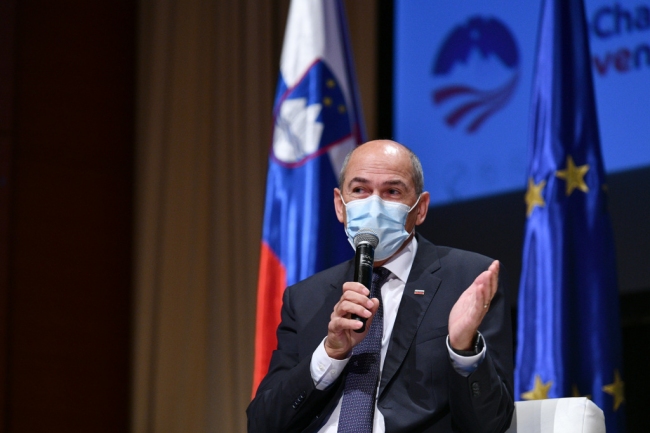Prime Minister Janez Janša believes Slovenia has the potential to become one of the fifteen most competitive countries in the world. He said this could be achieved through improving the supporting system for business, de-bureaucratisation and a more efficient public sector.
Janša told the business breakfast hosted by the American Chamber of Commerce in Slovenia (AmCham Slovenia) that Slovenia had made some progress during the last years of economic growth but had been taking small steps. He noted the country ranked 35th among 63 countries in the latest IMD World Competitiveness Ranking. But given its potential it could easily rank among the top 15, he said.
The prime minister assessed that the Slovenian economy was successfully adapting to global trends and was even more advanced in some fields. But it is lagging behind when it comes to the support environment provided by the state. Janša attributes this to the fact that the public sector has been ruled by an equal pay policy, so the best staff has been departing to the private sector or abroad. The first goal of the government is to reduce the gap between the public and private sectors in terms of their adjusting to the needs of modern times, he said. Otherwise, wasted opportunities, unused EU funds, red tape and unfulfilled development goals will stay on the agenda.
The public sector boasts good, motivated and qualified staff, so the government is working to adjust the pay system to encourage them to stay and attract those who have left the country to come back. To cut red tap, the government has founded a special strategic council led by tax expert Ivan Simič, Janša noted.
The government will do all it can to improve the support environment for the economy and foreign investment, including through more efficient drawing of EU funds that will be available to Slovenia, the prime minister asserted. He also sees an opportunity in western countries moving critical industries from Asia back to the West.
According to the prime minister, the coming years will be marked by large infrastructural projects that this government has managed to activate after a standstill. The government is thinking about inviting private investors to participate in major projects or have citizens invest part of their savings in the projects. But Janša is aware that people’s trust in the state would have to be restored first.
This could be hard because some politicians claim that everything should be nationalised and because some negative experiences from the past, which obstruct the development of the capital market, he said. Touching on structural reforms, Janša said the coalition was realistic, so it would not start working on a comprehensive pension reform yet. Now is not the time, he said, adding that the cabinet would, however, take several steps to improve the situation in the pension fund.
One of them is the planned demographic fund, which Janša said would improve the management of state assets, lift the burden off of budget, provide additional funds for long-term care and encourage family policy. The PM has no doubt that the passage of the demographic fund bill would raise dust. Politicians have been promising this for years but so far nothing has happened. Asked why he thought this time would be different, he said now was the first time that the government had actually adopted the bill. He is confident the support would persist until the vote in parliament.
Janša said it was not excluded that the management of the fund would in the future be left to foreign experts to make sure it was in line with global capital flows. But he also pointed to the negative experience with foreign experts in the case of the bad bank. The prime minister also commented on Slovenia’s position in the EU and trans-Atlantic relations. He said Slovenia would not go into debate on what is the core of Europe, what is the German-French train and what is the Visegrad Group. “Slovenia’s goal is for the EU to be preserved along with its current framework of decision-making.” After the shocks it has experienced in the past year, the EU now needs to stabilise, Janša believes.
It is in Europe’s and Slovenia’s interests that the trans-Atlantic relations are good, he said. He thinks the US is an equally important factor now as it was 30 years ago when Slovenia gained independence. Strategically speaking, Europe and the US are one unit in terms of their values and to a large extent also their economies. “History has shown that in the most crucial moments Europe can count on the US after all,” he said. However, Europe must also become more independent when it comes to providing for safety in its neighbourhood, he added.
Source: STA
You can watch the video of the event HERE.
